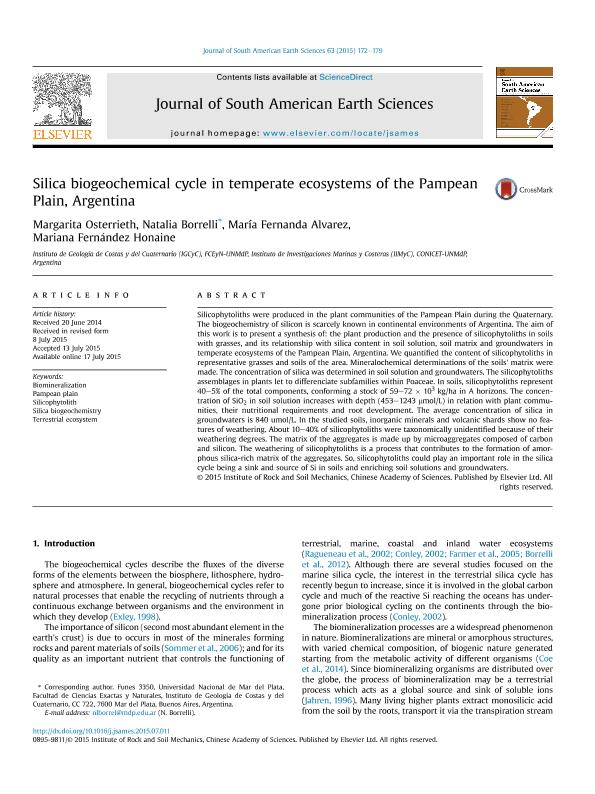Mostrar el registro sencillo del ítem
dc.contributor.author
Osterrieth, Margarita Luisa

dc.contributor.author
Borrelli, Natalia Lorena

dc.contributor.author
Alvarez, Maria Fernanda

dc.contributor.author
Fernández Honaine, Mariana

dc.date.available
2018-06-28T19:46:44Z
dc.date.issued
2015-11
dc.identifier.citation
Osterrieth, Margarita Luisa; Borrelli, Natalia Lorena; Alvarez, Maria Fernanda; Fernández Honaine, Mariana; Silica biogeochemical cycle in temperate ecosystems of the Pampean Plain, Argentina; Pergamon-Elsevier Science Ltd; Journal of South American Earth Sciences; 63; 11-2015; 172-179
dc.identifier.issn
0895-9811
dc.identifier.uri
http://hdl.handle.net/11336/50481
dc.description.abstract
Silicophytoliths were produced in the plant communities of the Pampean Plain during the Quaternary. The biogeochemistry of silicon is scarcely known in continental environments of Argentina. The aim of this work is to present a synthesis of: the plant production and the presence of silicophytoliths in soils with grasses, and its relationship with silica content in soil solution, soil matrix and groundwaters in temperate ecosystems of the Pampean Plain, Argentina. We quantified the content of silicophytoliths in representative grasses and soils of the area. Mineralochemical determinations of the soils' matrix were made. The concentration of silica was determined in soil solution and groundwaters. The silicophytoliths assemblages in plants let to differenciate subfamilies within Poaceae. In soils, silicophytoliths represent 40-5% of the total components, conforming a stock of 59-72×103kg/ha in A horizons. The concentration of SiO2 in soil solution increases with depth (453-1243μmol/L) in relation with plant communities, their nutritional requirements and root development. The average concentration of silica in groundwaters is 840 umol/L. In the studied soils, inorganic minerals and volcanic shards show no features of weathering. About 10-40% of silicophytoliths were taxonomically unidentified because of their weathering degrees. The matrix of the aggregates is made up by microaggregates composed of carbon and silicon. The weathering of silicophytoliths is a process that contributes to the formation of amorphous silica-rich matrix of the aggregates. So, silicophytoliths could play an important role in the silica cycle being a sink and source of Si in soils and enriching soil solutions and groundwaters.
dc.format
application/pdf
dc.language.iso
eng
dc.publisher
Pergamon-Elsevier Science Ltd

dc.rights
info:eu-repo/semantics/openAccess
dc.rights.uri
https://creativecommons.org/licenses/by-nc-nd/2.5/ar/
dc.subject
Biomineralization
dc.subject
Pampean Plain
dc.subject
Silica Biogeochemistry
dc.subject
Silicophytolith
dc.subject
Terrestrial Ecosystem
dc.subject.classification
Geociencias multidisciplinaria

dc.subject.classification
Ciencias de la Tierra y relacionadas con el Medio Ambiente

dc.subject.classification
CIENCIAS NATURALES Y EXACTAS

dc.title
Silica biogeochemical cycle in temperate ecosystems of the Pampean Plain, Argentina
dc.type
info:eu-repo/semantics/article
dc.type
info:ar-repo/semantics/artículo
dc.type
info:eu-repo/semantics/publishedVersion
dc.date.updated
2018-06-26T13:44:42Z
dc.journal.volume
63
dc.journal.pagination
172-179
dc.journal.pais
Estados Unidos

dc.description.fil
Fil: Osterrieth, Margarita Luisa. Universidad Nacional de Mar del Plata. Facultad de Ciencias Exactas y Naturales. Instituto de Geología de Costas y del Cuaternario. Provincia de Buenos Aires. Gobernación. Comisión de Investigaciones Científicas. Instituto de Geología de Costas y del Cuaternario; Argentina. Consejo Nacional de Investigaciones Científicas y Técnicas; Argentina
dc.description.fil
Fil: Borrelli, Natalia Lorena. Universidad Nacional de Mar del Plata. Facultad de Ciencias Exactas y Naturales. Instituto de Geología de Costas y del Cuaternario. Provincia de Buenos Aires. Gobernación. Comisión de Investigaciones Científicas. Instituto de Geología de Costas y del Cuaternario; Argentina. Consejo Nacional de Investigaciones Científicas y Técnicas; Argentina
dc.description.fil
Fil: Alvarez, Maria Fernanda. Universidad Nacional de Mar del Plata. Facultad de Ciencias Exactas y Naturales. Instituto de Geología de Costas y del Cuaternario. Provincia de Buenos Aires. Gobernación. Comisión de Investigaciones Científicas. Instituto de Geología de Costas y del Cuaternario; Argentina. Consejo Nacional de Investigaciones Científicas y Técnicas; Argentina
dc.description.fil
Fil: Fernández Honaine, Mariana. Universidad Nacional de Mar del Plata. Facultad de Ciencias Exactas y Naturales. Instituto de Geología de Costas y del Cuaternario. Provincia de Buenos Aires. Gobernación. Comisión de Investigaciones Científicas. Instituto de Geología de Costas y del Cuaternario; Argentina. Consejo Nacional de Investigaciones Científicas y Técnicas; Argentina
dc.journal.title
Journal of South American Earth Sciences

dc.relation.alternativeid
info:eu-repo/semantics/altIdentifier/doi/http://dx.doi.org/10.1016/j.jsames.2015.07.011
dc.relation.alternativeid
info:eu-repo/semantics/altIdentifier/url/https://www.sciencedirect.com/science/article/pii/S0895981115300286
Archivos asociados
